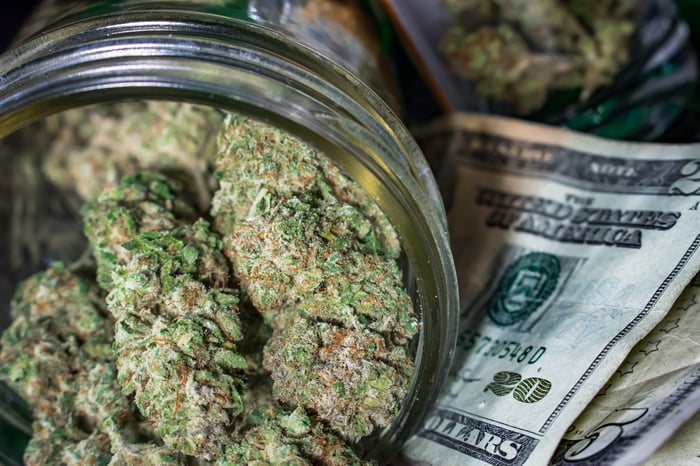No one ever said that launching a high-growth industry from the ground up (literally) was easy. Just ask the cannabis industry and pot stock investors for confirmation.
The pot industry entered 2019 with (pardon the pun) high hopes. Unfortunately, those hopes were replaced by deep disappointment when the curtain closed on the year. Supply bottlenecks and shortages dominated the Canadian landscape, while high tax rates and a resilient black market made life difficult for U.S. multistate operators. Put simply, what could go wrong did go wrong for marijuana stocks and the industry as a whole in 2019.
While a new year does bring new opportunities, a handful of the same challenges that affected the industry in 2019 have become even more pronounced in 2020. In particular, financing remains a major worry for both Canadian and U.S. pot stocks.

Image source: Getty Images.
Cannabis stocks are running on cash fumes, report suggests
Earlier this week, boutique investment banking company Ello Capital put this concern into glaring focus. Ello wound up looking at 13 of the largest U.S. pot stocks, as well as seven of the largest Canadian cannabis stocks, and estimated how long they could survive given their current monthly cash burn and available cash on hand. The results were definitely surprising.
According to Ello, the average U.S. pot stock has just 14 months of available cash before running out of money. Meanwhile, the seven Canadian pot stocks it examined had only 6.5 months of cash liquidity, on average, before running out.
In total, the following 10 pot stocks have 10 months or less of available cash on hand, per Ello Capital:
- Green Growth Brands: 0.9 months
- 4Front Ventures: 1.1 months
- Aurora Cannabis (ACB -1.15%): 2.3 months
- Tilray: 3.7 months
- The Green Organic Dutchman: 3.9 months
- MedMen Enterprises (MMNFF): 6 months
- HEXO (HEXO): 6.5 months
- Canopy Growth (CGC 1.28%): 7.7 months
- Harvest Health & Recreation: 9.2 months
- iAnthus Capital Holdings: 10 months
No doubt, some of these projections are eye-opening. However, it's important to note that Ello's estimates don't take into consideration short-term investments or cash used in acquisitions. For example, Canopy Growth ended the September quarter with 2.74 billion Canadian dollars ($2.06 billion U.S.) in cash, cash equivalents, and short-term investments, combined. However, Ello is taking less than half this amount into account when tabulating Canopy's cash runway, thus leading to a forecast of only 7.7 months of cash remaining, despite a $4 billion equity investment from Constellation Brands in November 2018.

Image source: Getty Images.
Ello is probably correct about the direness of some of these situations
While Canopy Growth is far better off than the above figures imply, other pot stocks are genuinely in trouble.
Aurora Cannabis, for instance, is forecast to run out of cash by midyear, according to GLJ Research founder Gordon Johnson, while Ello suggests that Aurora's doomsday is even closer -- although Ello failed to account for CA$39.4 million in marketable securities on the company's balance sheet at the end of the fiscal first quarter.
Nevertheless, recent corporate moves suggest that Aurora is in serious trouble. The company has seen plenty of management turnover, has halted construction at two key projects while putting another greenhouse up for sale, and announced plans to write off close to $1 billion from its balance sheet. Further, with the company's credit line reduced by CA$141.5 million, Aurora's only means of raising capital at the moment is to sell its stock and dilute its already beaten-down shareholders even more.
In the U.S., MedMen Enterprises looks to be operating on borrowed time. Despite securing up to $280 million in financing from private equity firm Gotham Green Partners, it announced in December that the final $115 million of this financing was no longer available for use. In recent weeks, MedMen has attempted to pay its vendors with its own common stock -- a testament to how serious its cash deficiency has become. Even after calling off its all-stock acquisition of PharmaCann in October, it's unclear if MedMen has the capital to survive.
HEXO is another obvious concern. Even though it's been able to raise around CA$100 million since October through a combination of stock offerings and a convertible debenture, HEXO is no lock to have enough capital to execute on its long-term strategy. Mind you, that's with HEXO idling about a third of its peak capacity cultivation and laying off 200 workers in an effort to significantly reduce its operating expenses.
It is worth noting that a small number of pot stocks have a longer cash runway. According to Ello, Cronos Group has roughly seven years of cash on hand, with Curaleaf and Cresco Labs in the U.S. having in excess of three years, and more than two years, of respective cash.

Image source: Getty Images.
Will things improve for pot stocks?
Keeping in mind that there are limitations to Ello's projections, the big question at this point has to be, "Will pot stocks go bankrupt?" I believe the answer is most definitely yes. We will, at some point, see one or more brand-name pot stocks fail. Failure is a part of every industry, and the fast-growing weed industry is no exception.
In Canada, despite cannabis being legal, banks are simply unwilling to extend the olive branch due to the poor operating performances of marijuana businesses. These operating results are unlikely to improve significantly until Ontario issues additional retail store licenses and a lot of dispensaries open for business. That bodes poorly for the likes of Aurora Cannabis and HEXO, which are both counting on Canada's most populous province.
Meanwhile, U.S. cannabis stocks very much need banking reform measures to pass in the Senate. Senate Banking Committee Chairman Mike Crapo (R-Idaho) has offered a number of suggestions to the Secure and Fair Enforcement (SAFE) Banking Act that would neutralize its effectiveness and has, for all intents and purposes, stalled the SAFE Banking Act on Capitol Hill. Without easy access to traditional forms of financing, there's no question that multistate operators that have overextended themselves (ahem, MedMen) could be in serious trouble.
Without any immediate remedies on the financing front for North American pot stocks, things could get worse before they get better.





